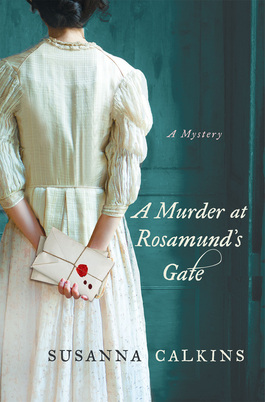 I'm still on a hiatus from this blog for a little while longer...but I've been having fun writing guest posts and doing interviews for other blogs, webzines and even my local paper. To see what I've been writing about, please check out my virtual tour. Also, I received the official HARD COPY of A Murder at Rosamund's Gate yesterday in the mail!!!! That's about as exciting as it gets!!! Oh, and my book was selected as a Barnes & Noble Booksellers' Pick for April! What an honor...I'm thrilled!
4 Comments
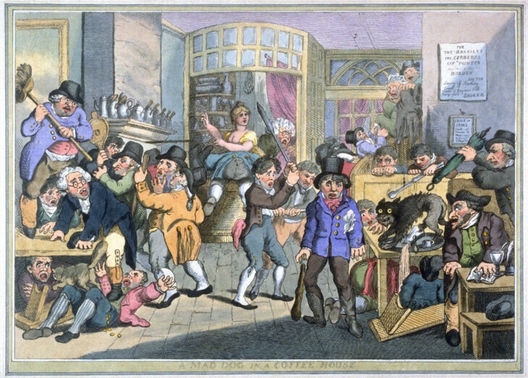 English: "A Mad Dog in a Coffee-House" (1809) by Rowlandson, showing a rabid dog terrorizing a coffee house in 18th century England (possibly Garrison's or Jonathan's, near the Exchange) Such chaos! Such mayhem! Okay, that's all I've got. There's a caricature in here somewhere, but I'd have to do a little research to figure it out. Unfortunately, I don't have the time... Once again, I need to take an extended coffee break, aka temporary blog hiatus. I knew I was having a minor problem when I kept starting posts with no time to finish them.
So I'll be finishing gallons of coffee in my attempt to balance work, teaching and writing...all while doing publicity stuff for A Murder at Rosamund's Gate...did I mention that it's coming out April 23? :-) But I'll be back soon! In the meantime, I'll leave you with the above image as a writing prompt. What's going on here? What schemes are afoot? Or most simply of all, Who let the dog in? Happy writing! 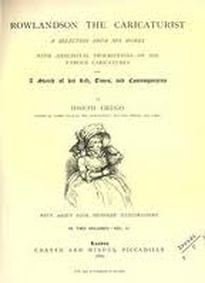 ********************************************** A QUICK EXPLANATION OF THE IMAGE!!! I just had to research the meaning behind this image (despite being on my self-imposed blog hiatus). In doing so, I came across this interesting work by Joseph Grego, who wrote extensively about Rowlandson in 1922. He offers an interesting explanation of the painting that gets at the shifting economic concerns at the time. In his own inimitable words, Grego writes: "March 20, 1809. The advent of a nondescript animal, … assumed to be a ferocious mad dog, has produced the utmost terror and confusion amongst the grave frequenters of a mercantile coffee-house… All the city brokers, and pillars of change found therein are seared out of their sober senses; some…are paralyzed with fear; others are trying to creep under the tables; a few are seeking escape by the door which they are effectually blocking; and groups of affrighted fugitives are endeavoring to gain the refuge of the staircase….Comfortable citizens are thrown on their backs, like turtles, and trodden on, while the pressure of viler bodies above is expressing a stream of specie from the well-filled pockets of the overthrown…." So what does all this mean? Essentially, something seemingly innocuous has pervaded the economy, and it will cause mayhem. The explanation for this mayhem apparently can be found on the advertisment (notice) stuck on the back wall, which offers an important piece of shipping intelligence. The notice warns 'lay off Barking Creek," the location of a large fishing fleet in London. Barking Creek...rabid dog, get it? (but now back to writing!) What's going on here?
You'll have to check out my post on A Bloody Good Read: Where Writers and Readers of Mysteries Talk Shop to find out!!! 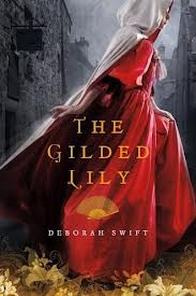 www.deborahswift.co.uk A few weeks ago, I was fortunate enough to win a free copy of Deborah Swift's atmospheric The Gilded Lily (St. Martin's Griffin, 2012), a historical novel set in Restoration England. She was gracious enough to let me interview her on my blog today. *************************************************** The official synopsis: England 1660 Ella Appleby believes she is destined for better things than slaving as a housemaid and dodging the blows of her drunken father. When her employer dies suddenly, she seizes her chance--taking his valuables and fleeing the countryside with her sister for the golden prospects of London. But London may not be the promised land she expects. Work is hard to find, until Ella takes up with a dashing and dubious gentleman with ties to the London underworld. Meanwhile, her old employer's twin brother is in hot pursuit of the sisters. Set in a London of atmospheric coffee houses, gilded mansions, and shady pawnshops hidden from rich men's view, Deborah Swift's The Gilded Lily is a dazzling novel of historical adventure. ********************************************************************************** 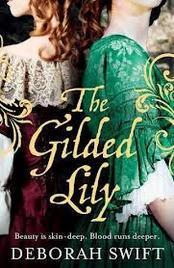 What inspired you to write The Gilded Lily? When I originally began The Gilded Lily I was interested in the fact that the ideal of women’s beauty has changed over time. The years when England was suddenly released from the grip of Puritanism seemed an ideal choice to set a novel about beauty and greed. In many ways the 1660s were like the 1960s and at that time there was a great flowering of interest in fashion, the theatre, beautiful women (and men!) and a more laissez-faire lifestyle. The Gilded Lily in the novel is the name of a place where women go to buy perfumes and potions, an enterprise I thought fitted well into this new culture of hedonism. Why did you set your story in 166o? I have always been fascinated by the Restoration – I used to design theatre costumes and did a couple of plays from this period and just loved the whole look. It was a very narrow period of celebration between Puritan rule and the outbreak of the Plague and then the Fire of London in 1665 and 1666. But also London in the 17th century had a much darker face hidden beneath the glamour – it was a much less tolerant society than our own, a magnification of all our vices of bigotry, fear of another’s differences and cruelty to others less fortunate than ourselves. Class structures were more fiercely guarded and it was hard to claw your way upward to a reasonable standard of living. How did you go about researching your story? Did your work as a set and costume designer for the BBC inform your research? I usually spend about six months altogether researching before writing. Most of the research is about ordinary every day objects we take for granted – such as the price of a pair of gloves, or how far a hired horse can gallop in a day. (I spent a lot of time figuring out this conundrum too!-SC). My previous job helps in that I already have research methods in place, and a good basic knowledge of most periods from my experience designing plays. I also have some contacts who are experts in their field who I can ask when I'm stuck! I use books, the internet and museums. Sometimes I need to write to people or interview them for the information I need. For this novel I had to research pawn-broking, wig-making and gunpowder manufacture as well as the apothecary’s ingredients for beauty products. If you had lived in the 1660s, what kind of occupation/station/life could you imagine yourself having? Or put another way, if you wrote yourself into the novel, what kind of character would you be? Well not gunpowder manufacturing or wig-making, that's for sure! Ella and Sadie try these and they are not my idea of fun! Most working women worked cripplingly long hours for little pay so I think I would prefer to be the rich daughter of a man who could afford to send me to The Gilded Lily for my perfumes and potions. On second thoughts, perhaps not, as most of the skin creams contained white lead, mercury, or other dangerous substances. But I did read that there were lots of bookstalls in St Paul's Church, so perhaps I'd be a bookseller! Or even print up my own anonymous chapbooks or pamphlets. What was the most interesting or surprising thing that you learned while writing your novel? One of the most surprising was that the average age of the population of London at that time was very young. Of course people generally died younger, and 85,000 men had been lost in the Civil Wars, and young men took their places. Some men were sitting in Parliament at only 16 years old. Large gangs of youths - displaced from their homes or who had been soldiers in the armies - roamed the city searching for employment. What a place to put two naive country girls! How long did it take you to write The Gilded Lily? How many drafts did it take? It took just over eighteen months, though I had been mulling the idea for longer. I do a rough draft first with only basic research to draft the storyline. Then I research in more depth and the storyline develops and deepens. Sometimes it changes if the research leads me in a different direction. A third draft is about smaller details and characterisation. After that I draft and edit until I think it's ready, which can be about changing whole sections, or about worrying over a single word. What advice would you give to an aspiring novelist? Don't be in too much of a hurry to get the book out there. Editing is vital. In your editing process you can check through each character's scenes for consistency to make sure they are real people. If you are self-publishing make sure you get a professional editor. I'm lucky in that I have a publisher and a great editorial team behind my books. There are many good books being self-published now which could have been GREAT books, given an outside editorial eye. We need great books and great new writers so why settle for anything less? And what are you working on now? My next book is called 'A Divided Inheritance'. It is set in Stuart England and Golden Age Spain and tells the story of a lace trader's daughter who has to travel to Seville to save her beloved home and rescue her inheritance from her firebrand cousin. It will be out in October 2013. It will be hard to wait till October, that's for sure! Thank you, Dee! Deborah can be reached through her website (www.deborahswift.co.uk), Blog (www.deborahswift.blogspot.com)or through twitter @swiftstory. |
Susanna CalkinsHistorian. Mystery writer. Researcher. Teacher. Occasional blogger. Categories
All
Archives
May 2023
|
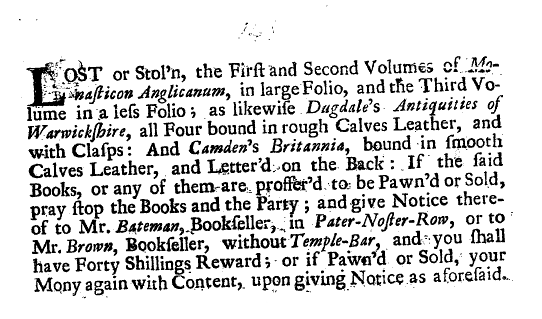
 RSS Feed
RSS Feed